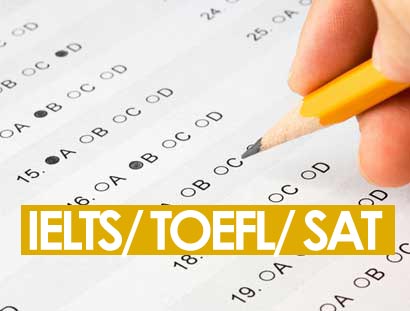TOEFL, IELTS and SAT-Essential test requirements for college application abroad

In recent years, Nepali youth have been consistently applying abroad for studies. In this process, students have to submit various documents and standardized tests results, such as Test of English as a Foreign Language (TOEFL), International English Language Testing System (IELTS) and Scholastic Assessment Test (SAT), as per the need of the college. Though most Nepali students are familiar to testimonials such as essays, financial documents and academic grades, the mentioned standardized tests seem to be a little tricky, as their way of conduct is much different than our country’s regular academic exams.
TOEFL and IELTS are the tests that assess the English language ability of the students such as reading, writing, speaking and listening. Though TOEFL has two formats – Paper Based Test (PBT) and Internet Based Test (IBT) – Nepali test centers conduct exams of TOEFL IBT, as they are more reliable. The full score for IELTS is 9.0 and TOEFL IBT is 120, and the requirement for qualification through these test scores varies from college to college.
Generally, students applying to American colleges take TOEFL, while students applying to Australian and UK based colleges take IELTS, though both have equal recognition unless specified by the college. IELTS uses British English as a mode of communication, while TOEFL is based on American English. Thus, if the college accepts any of the two tests, one should go for the test in which the type of the English language is the most familiar to the student. At present, the cost of taking TOEFL is USD 160 and that of IELTS is Rs 12000.
Likewise, SAT is a vital submission for American colleges. There are two types of SAT tests: reasoning test and subject tests.SAT reasoning test, often called as SAT I, evaluates the student’s critical thinking and language skills. Therefore, SAT reasoning test have writing, critical reading and mathematics section, where, apart from writing, every question is multiple choice. SAT reasoning test scores are subjected to critical evaluation by admission officers and thus, the scores of this test can have a huge impact over one’s college acceptance and the amount of financial assistance he receives.
Likewise, SAT subject test, commonly known as SAT II, analyses one’s academic excellence. The number of subjects required by the colleges varies according to the college and in most cases, SAT II is optional. There are altogether 20 subject choices, where Nepali students usually take Physics, Chemistry, Mathematics level 1 or 2, Biology and Literature.
In Nepal, SAT is conducted six times a year – in May, June, October, November, December and January. There are altogether three SAT centers in Nepal: Lincoln School, St. Xavier’s School and Rato Bangala School. Every student should take along the admission ticket, and passport as a proof of valid identification. The registration fee for the SAT reasoning test is USD 91 and that for the SAT subject test depends upon the number of subjects taken.
As many students opting for standardized tests are new to these sorts of exam patterns, students basically search for institutions that provide guidance and train them for the tests. Therefore, in the past few years, many educational institutions have mushroomed in the valley.
One of such institutions, Hub International Education, Bagbazar, Kathmandu, has been consistent in training students for the standardized tests. Speaking about the increasing trend of students taking these courses and their achievements, Udhav Khadka, the managing director of the institution said, “There has been a significant increase in the number of students attending these courses. These students usually target English speaking countries. Though the students struggle at the beginning, they excel at the end of the course. Not just in our institution, but throughout Nepal, students usually get around 7 in IELTS, which is a commendable score.”
Similarly, Education Park in Civil Mall, Sundhara, has come up with a different notion for training the students. The students of this institute are provided with an hour of formal training every day, and then after, they are allowed to use its practice resources for an entire day. This concept has helped students excel in tests through intense practice.
However, although educational institutions help in boosting the skills of the test takers, one should not rely entirely on these institutes. The ultimate success in the test depends upon the student’s efforts and preparation.
23 July 2013
Posted on: 2013-07-26































